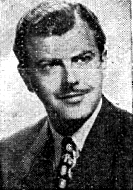 |
By Jack Sturman |
RADIO!!!É the fantastic, mysterious web which bridges continents and oceans in the twinkling of an eyelash. RADIO!!!Éan item which has come to play such a vital role in our every day scheme of things that without it the nation would be virtually paralyzed.
And what of the people behind the microphone? How did they come to start in this fabulous profession? What are the necessary personal assets for radio announcing?
Elwood Glover, ace C.B.C. network announcer, has this to say on the subject:
 |
"An absolute and undying ambition to succeed is the most important mental attitude a prospective announcer can adopt. Of course, voice and personality are two essentials that are not to be overlooked. For some, both these qualities may be inherent but generally speaking the bulk of the radio voices you hear on the airÉannouncing the various showsÉ giving news commentaries and spot announcementsÉ these voices have been developed because of a magnetic attraction to a medium that is thrilling and gigantic in its scope. |
"Nerves too, play an important part in determining the fate of announcers. The voice is the first thing that shows a troubled mentality and therefore announcers should possess a high degree of self-mastery and control. That old idiom, "You Can't Afford to Make The Same Mistake Twice," isn't acceptable to radio announcers. To us it reads, "You Can't Afford to Make The Same Mistake Once."
Because hours in this profession are irregular, sometimes calling for night and early morning work, good health is a requisite. You need an extensive command of English, familiarity with diverse subjects, and ability to think quickly and talk impromptu for emergencies.
"I can remember as far back as 1926-27 when relatives of mine in Western Canada bought a radio set. Those were the days when radios came with batteries, three tuning knobs, a horn speaker and a maze of tubes and wires. My own family was very conservative in manner and consequently our household did without radio until 1930. I was twelve at the time and remember the great thrill I received when I twisted the dial and I was able to get Chicago, Pittsburgh and stations in North Dakota. It was really a great thing."
"My first direct contact and interest in radio came in 1932 during my high school days in Moose Jaw. I played saxophone in the school orchestra, and every week we had the weird and wonderful experience of doing a half-hour show over Moose Jaw's lone radio station. My fascination in radio receiving an added shot up in the arm with these weekly shows, but high school doesn't last forever and the time came for me to set aside music and my high school days and think seriously about a career. I was one of those kids who had no idea of what vocation to choose. A lawyerÉ a doctor, nothing appealed to me. So confused was I that I enrolled for a straight arts course. Then by sheer accident in 1936 after my second year at university, I received an invitation to audition for an announcer at the radio station in Moose Jaw. The manager of the station remembered how interested I had been in radio when I had played in the orchestra four long years before. I knew this was it. At last I realized what I wanted to do, and so in June, 1936, I took the audition and joined the announcing staff."
Small towns and cities provide the best opportunity for beginners to gain experience. Large stations usually require at least two years apprenticeship with small stations. More and more, college education is stressed. Study should include English Literature, Modern Languages or general arts course. Training in special radio school is also valuable.
"Well I really got a taste of radio in that little 100-watt station out in Moose Jaw. Besides being an announcer, my duties included operating in the control room (in those days transmitters weren't located miles out of town but rather right in the studios). I sold time to local advertisers, wrote copy and performed one hundred and one other jobs that kept me hopping twelve hours a day. There were only two other announcers besides myself plus station manager and two stenographers. One of my days read something like this: Mornings - Contact client for advertisingÉsell him program ideaÉ go back to studio and put idea on paperÉ return to see client for approval.
Afternoons - Build programsÉ announce and operateÉ write commercials, etc., etc. The great percentage of shows going out of our station were canned music programs. However, a disc jockey back in those days wasn't the specialist that he is today. I used to do a disc show at the station, which is almost the same, as I am doing now. That first disc show helped me develop manner and style, in fact the whole pioneering experience at that little station has been invaluable to me. To this day I really feel that no one can claim a serious career in radio unless they start in a small way in a small station."
"I don't detract for a minute the things you can learn in radio schools - they provide wonderful fundamentals which we had to learn the hard way because schools of this type were nonexistent but you can't really pass the test till you put the theories and ideas you learn into practice."
A rookie announcer on a small station averages from $100-$120 monthly. On larger commercial stations, salary ranges from $250-$300 monthly. Incomes are sometimes considerably augmented by special commercial assignments. Active announcers on larger metropolitan outlets make between $5,000-$10,000 annually. Top story announcers in this country earn up to $20,000 yearly. (All salary quotes are approximate and are based on Canadian radio only). Announcing profession is highly competitiveÉ openings small in number in comparison to number of applicants. Helpful literature may be found in "Radio Announcer's Handbook," by Ben Graf Henneke; "Radio Directing," by Earle McGill, Write Mr. W. S. Brody, Supervisor of Broadcasting and Languages, C.B.C., Toronto, for other valuable pamphlets or books.
"Gaining experience, I began to receive assignments from the C.B.C. doing special events broadcasts in the West. C.B.C. officials, a year and a half after my first radio job, offered me a post on the announcing staff of their new 50,000 watt station in Toronto in 1938, where I have been employed for the past ten years. Radio announcing being the hectic and precarious profession it is, I'm particularly proud of the fact that I have only worked for two employers in my twelve years of radio."
"If you hope to succeed in this profession you must always walk away from the "mike" with the thought that the next broadcast will be a better one."
©1999 TG Magazine/Le Magazine TG
tgmag@tgmag.ca